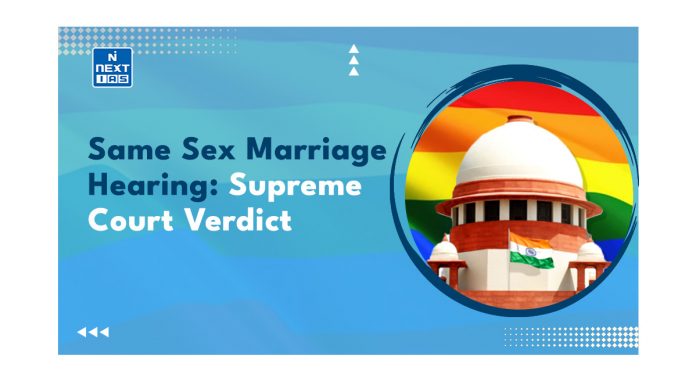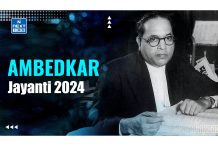The Supreme Court on Tuesday refused to recognize same sex marriages or civil unions for homosexual couples.
The Supreme Court today did not legalise same sex marriage becoming a cause of dissapointment for those who were seeking that the court will intervene rightfully for the cause. The Supreme Court called upon the center to form a committee that will address the issues of same sex couples like getting the ration card, pension, gratuity and succession issues.
What is Same Sex Marriage?
Same sex marriage refers to the legal and social recognition of marriage between individuals of the same gender or sexual orientation. In such marriages, two people of the same sex come together in a formal union, just like opposite-sex couples, with the same legal rights and responsibilities.
Same Sex marriage: Equality Perspective
Advocates for marriage equality argue that denying same-sex couples the right to marry is a form of discrimination and a violation of their human rights. They believe that all individuals should have the same legal rights and access to the benefits and responsibilities that come with marriage, such as inheritance rights, medical decision-making, and access to spousal benefits and protections. Over the years, many countries have legalized same sex marriage, and in some cases, it has been achieved through legislative changes, court rulings, or referendums.
Supreme Court Hearing: Views on Four Key Issues
| ADOPTION RIGHTS FOR QUEER COUPLES | FUNDAMENTAL RIGHT TO MARRIAGE | INTERPRETATION OF SPECIAL MARRIAGE ACT | ON THE OPTION OF CIVIL UNION FOR QUEER COUPLES |
| The Supreme Court bench delivered a split 3:2 verdict regarding adoption rights. In this decision, the Court upheld the existing law, which does not extend adoption rights to same-sex couples. | All the judges reached a unanimous consensus in asserting that there is no absolute right to marriage, and same-sex couples cannot assert it as a fundamental right. | The Court also unanimously rejected the challenge to the provisions of the Special Marriage Act. | The majority opinion stated that the state should support and enable this choice for those who wish to exercise it. In their separate minority opinions, CJI Chandrachud and Justice Kaul ruled that same-sex couples are entitled to have their relationships recognized as civil unions and can avail consequential benefits. |
Special Marriage Act
The institution of marriage in India is a social tradition where couples come together in the presence of witnesses, and it does not necessarily require legal sanction. For those who wish to have a legally recognized marriage, they can opt for a “court marriage.” The Special Marriage Act of 1954 offers provisions for marriage for all Indian nationals, regardless of their religion or faith. The Supreme Court took was deliberating whether the Special Marriage Act can be made gender neutral
Challenges Associated with Same Sex Marriage
- Open Discrimination: The lack of recognition for same-sex relationships is a form of discrimination by the State. Every individual should have the freedom to choose whom they love and marry, as affirmed by the Supreme Court’s previous judgment in the Puttaswamy case, which recognized privacy as a fundamental right.
- Violation of Fundamental Rights: The Indian Constitution grants citizens certain fundamental rights that should not be infringed upon by the State based on personal choices.
- Natural and Unnatural Relationship: Governments worldwide have often argued against homosexual relationships as being ‘unnatural.’ However, societal notions of what is natural or unnatural have evolved over time, with increasing emphasis on individual rights and freedoms.
- Legal Issues Regarding Progeny: Same-sex couples face legal recognition challenges when surrogating or adopting a child. The absence of a legal framework also affects the child’s right to legal safety and security.
- Social Morality vs. Constitutional Morality: There is a conflict between social values and constitutional values. The Indian Constitution and the judiciary’s interpretation have generally been more progressive and individual-centric than prevailing societal ethics. For instance, the case of Sabarimala, which ended gender-based discrimination, faced significant opposition from society.
Way Forward
- Raise Societal Awareness and Destigmatize Homosexual Individuals: Launch awareness campaigns aimed at educating the public about the challenges faced by homosexuals. Generating widespread societal support can help dispel negative stereotypes associated with LGBTQ+ individuals.
- Encourage Role Models: Prominent individuals who occupy influential positions in society and are open about their sexuality can play a pivotal role in sharing their experiences and stories, serving as positive role models.
- Anti-Discriminatory Legal Framework: The legal system should adapt to changing times. This involves amending laws related to property, adoption, inheritance, and other areas to establish a comprehensive anti discrimination framework.
In conclusion, recognising and legalizing same sex marriages in India is essential to protect the fundamental rights and dignity of all citizens, regardless of their sexual orientation. It requires a combination of legal amendments, public awareness, and the support of influential figures in society to make this vision a reality.
Source: Indian Express









